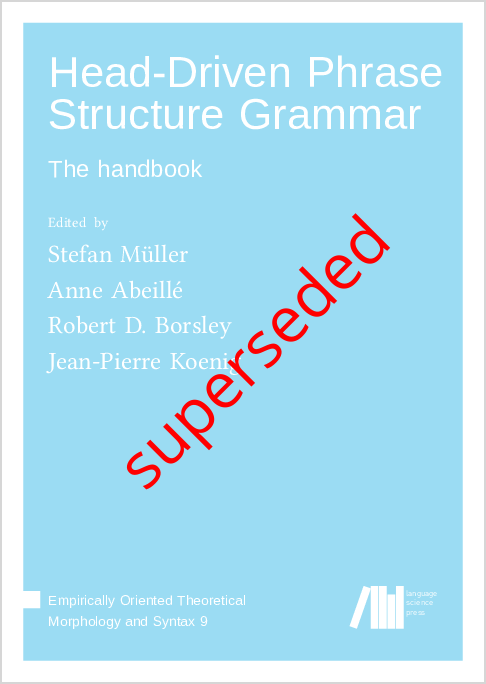We log anonymous usage statistics. Please read the privacy information for details.
Superseded: Head-Driven Phrase Structure Grammar: The handbook
Keywords:
HPSGSynopsis
A new version of this book is available at https://langsci-press.org/catalog/book/478.
Head-Driven Phrase Structure Grammar (HPSG) is a constraint-based or declarative approach to linguistic knowledge, which analyses all descriptive levels (phonology, morphology, syntax, semantics, pragmatics) with feature value pairs, structure sharing, and relational constraints. In syntax it assumes that expressions have a single relatively simple constituent structure. This volume provides a state-of-the-art introduction to the framework. Various chapters discuss basic assumptions and formal foundations, describe the evolution of the framework, and go into the details of the main syntactic phenomena. Further chapters are devoted to non-syntactic levels of description. The book also considers related fields and research areas (gesture, sign languages, computational linguistics) and includes chapters comparing HPSG with other frameworks (Lexical Functional Grammar, Categorial Grammar, Construction Grammar, Dependency Grammar, and Minimalism).
Chapters
-
Basic properties and elements
-
The evolution of HPSG
-
Formal background
-
The nature and role of the lexicon in HPSG
-
HPSG in understudied languages
-
Agreement
-
Case
-
Nominal structures
-
Argument structure and linking
-
Constituent order
-
Complex predicates
-
Control and raising
-
Unbounded dependencies
-
Relative Clauses in HPSG
-
Island phenomena and related matters
-
Coordination
-
Idioms
-
Negation
-
Ellipsis
-
Anaphoric binding
-
Morphology
-
Semantics
-
Information structure
-
Processing
-
Computational linguistics and grammar engineering
-
Grammar in dialogue
-
Gesture
-
HPSG and Minimalism
-
HPSG and Categorial Grammar
-
HPSG and Lexical Functional Grammar
-
HPSG and Dependency Grammar
-
HPSG and Construction Grammar

Downloads
Published
October 27, 2021
LaTeX source on
GitHub
Print ISSN
2366-3529
Cite as
Müller, Stefan, Abeillé, Anne, Borsley, Robert D. & Koenig, Jean-Pierre (eds.). 2021. Head-Driven Phrase Structure Grammar: The handbook. (Empirically Oriented Theoretical Morphology and Syntax 9). Berlin: Language Science Press. DOI: 10.5281/zenodo.5543318
Copyright (c) 2019 Language Science Press
Details about the available publication format: PDF
PDF
ISBN-13 (15)
978-3-96110-255-6
doi
10.5281/zenodo.5543318
Details about the available publication format: Hardcover
Hardcover
ISBN-13 (15)
978-3-98554-999-3



